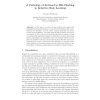Free Online Productivity Tools
i2Speak
i2Symbol
i2OCR
iTex2Img
iWeb2Print
iWeb2Shot
i2Type
iPdf2Split
iPdf2Merge
i2Bopomofo
i2Arabic
i2Style
i2Image
i2PDF
iLatex2Rtf
Sci2ools
71
Voted
ALT
2002
Springer
2002
Springer
A Pathology of Bottom-Up Hill-Climbing in Inductive Rule Learning
In this paper, we close the gap between the simple and straight-forward implementations of top-down hill-climbing that can be found in the literature, and the rather complex strategies for greedy bottom-up generalization. Our main result is that the simple bottom-up counterpart to the top-down hill-climbing algorithm is unable to learn in domains with dispersed examples. In particular, we show that guided greedy generalization is impossible if the seed example differs in more than one attribute value from its nearest neighbor. We also perform an empirical study of the commonness of this problem is in popular benchmark datasets, and present average-case and worst-case results for the probability of drawing a pathological seed example in binary domains.
ALT 2002 | Greedy Bottom-up Generalization | Greedy Generalization | Machine Learning | Simple Bottom-up Counterpart |
| Added | 15 Mar 2010 |
| Updated | 15 Mar 2010 |
| Type | Conference |
| Year | 2002 |
| Where | ALT |
| Authors | Johannes Fürnkranz |
Comments (0)

